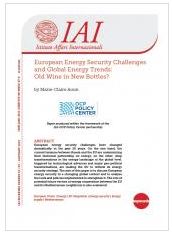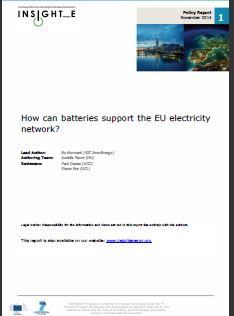Energy - Climate
In the face of the climate emergency and geopolitical confrontations, how can we reconcile security of supply, competitiveness, accessibility, decarbonization and acceptability? What policies are needed?
Related Subjects

COP30: An Inflection Point for Climate Action and Governance

The 30th Conference of the Parties (COP30), opening in Belém, Brazil, on November 10th 2025, convenes at a perilous moment.


European Energy Security Challenges and Global Energy Trends: Old Wine in New Bottles?
Paper produced within the framework of the IAI-OCP Policy Center partnership and presented at the international seminar "Morocco's Role in Fostering Euro-Mediterranean Energy Cooperation" organised in Rabat on 26 September 2014.

How can Batteries support the EU Electricity Network?
Policy Report, Publication Insight_E
Lead Author: Bo Normark (KIC InnoEnergy), co-author: Aurélie Faure-Schuyer (Ifri),
Reviewers: Paul Deane (UCL) and Steve Pye (UCL)
From 2020 to 2030, from Copenhagen to Paris: a mindset change for the European Climate Policy?
The European Councils of March 2007 and October 2014 have defined the major guidelines of the European climate policy for the 2010-2020 and 2020-2030 decades. These commitments have then been used as negotiation roadmaps for two major conferences on climate held under the United-Nations umbrella, in Copenhagen in 2009 and in Paris in December 2015. In both cases, the aim was, and still is, to reach a global agreement to take over the Kyoto Protocol. The first one was a failure for the European diplomacy and all hopes are now placed in the second, which may well be the last chance for the international climate talks.
Key messages for Europe from the World Energy Outlook 2014
Hot Energy Topic n° 5, Insight_E publication
Lead Author: Paul Deane (UCC)
Authoring Team: Ulrich Fahl (University of Stuttgart), Carole Mathieu (Ifri)
Reviewers: Kimon Keramidas (Enerdata)
Gas Strategy of China: Developing competion between national production and imports
The Chinese gas market is facing four key challenges and the government is elaborating responses which will have implications for the Chinese and world energy markets:
The EU Electricity Policy Outlook for the Smart Grid Roll-Out
The energy transition from a socio-economic system based on fossil fuels to a sustainable low-carbon system is a multi-facetted process. This “transformation” of the energy system, more specifically of the power system, creates several challenges.
Greenland and Iceland: Meeting Place of Global Powers in the Arctic
At the crossroads of American, European and Asian interests in the Arctic, Greenland and Iceland, the importance of which had for too long been underestimated, are set to play a central role in future regional developments. In order to exploit the potential of their growing economic ties with Asia, without becoming the Arctic “weak links”, Greenland and Iceland need to secure their economy on a long-term basis.

Strengths and weakness of the European Union gas security of supply
Lead Authors: Marie-Claire Aoun and Quentin Boulanger (IFRI); Authoring Team: Damir Pešut, Marko Matosović and Robert Bošnjak (EIHP); Paul Deane, James Glynn and Brian Ó Gallachóir (UCC); Reviewer: Nathalie Desbrosses (Enerdata)
Mines and Energy: Are Chinese Investments Playing with or against Markets?
China’s economic development has brought it to the center of natural resource markets.
Support independent French research
Ifri, a foundation recognized as being of public utility, relies largely on private donors – companies and individuals – to guarantee its sustainability and intellectual independence. Through their funding, donors help maintain the Institute's position among the world's leading think tanks. By benefiting from an internationally recognized network and expertise, donors refine their understanding of geopolitical risk and its consequences on global politics and the economy. In 2025, Ifri supports more than 80 French and foreign companies and organizations.







